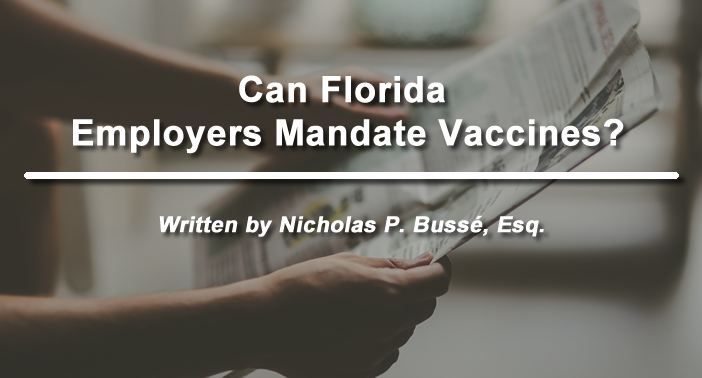While there are several COVID-19 vaccines on the market being distributed and used pursuant to the Food and Drug Administration’s Emergency Use Authorization, Pfizer’s COVID-19 was the first vaccine to be given the FDA’s full approval on August 23, 2021. Now the debate has started as to whether employers can mandate employees receive the vaccine.
Prior to the recent approval, most federal courts previously held employers had the power to require vaccination prior to the FDA’s recent vaccine approval. While many nationwide employers and government entities have exercised their right to require inoculation against COVID-19, and its variants, it appears the FDA’s approval may pressure employers to require a vaccine before welcoming employees back to the office.
In Florida, employers have the ability to terminate an employee with or without cause. Employers also do not need to provide an advance notice of termination. Employment in Florida is presumed to be “at-will” unless modified by a contract. However, Florida employers cannot terminate an employee for things such as race, religion, sex, nation origin, or age in accordance with both Federal and Florida law.
However, a federal district court in Texas recently decided to uphold a hospital’s vaccine mandate in Bridges v. Houston Methodist Hosp., CV H-21-1774, 2021 WL 2399994 (S.D. Tex. June 12, 2021). The lawsuit was filed on behalf of 117 Houston Methodist Hospital employees were terminated when they were not vaccinated against COVID-19 by the employer instituted deadline date. The Plaintiffs alleged they were wrongfully terminated in violation of Texas law, the vaccine mandate violated public policy, the vaccine mandate violated the 21 U.S.C §360bbb-3, and the mandate violated 45 Code of Federal Regulation §46.101.
The federal district court ultimately ruled the vaccine mandate did not violate Texas law; the mandate did not violate public policy as Texas public policy does not recognize an at-will employment exception; the mandate did not violate 21 U.S.C §360bbb-3 as the law does not apply to private employers nor does §360bbb-3 give individuals to bring suit against the government or an employer; and last, the mandate did not violate 45 Code of Federal Regulation §46.101 as the hospital is a private entity merely requiring a vaccine similar to the chicken pox vaccine. It should be noted, Texas is an “at-will” state similar to Florida.
The U.S. Equal Employment Opportunity Commission also issued an updated opinion with regards to vaccine mandates this past May. The new EEOC opinion states Federal Equal Employment Opportunity laws do not prevent an employer from requiring all employees physically entering the workplace to be vaccinated for COVID-19, so long as employers comply with the reasonable accommodation provisions of the Americans with Disabilities Act and Title VII of the Civil Rights Act of 1964 and other Equal Employment Opportunity considerations.
However, Florida’s “at-will” employment laws, the Bridges case, and the most recent EEOC opinion appear to be in conflict with recently proposed legislation, House Bill 6009, which seeks to prevent vaccine mandates during public health emergencies. This newest bill is in conjunction with Senate Bill 2006 which sought to ban the requirement of showing vaccination status, otherwise known as “vaccine passports.”
Despite these conflicting factors from the federal and state government, it is clear the debate about vaccine mandates will continue in both the Florida legislature and in the Florida judicial system. If you have questions or wish to speak with one of our experienced labor and employment attorneys, contacts us at https://www.taylordaylaw.com/contact/.

